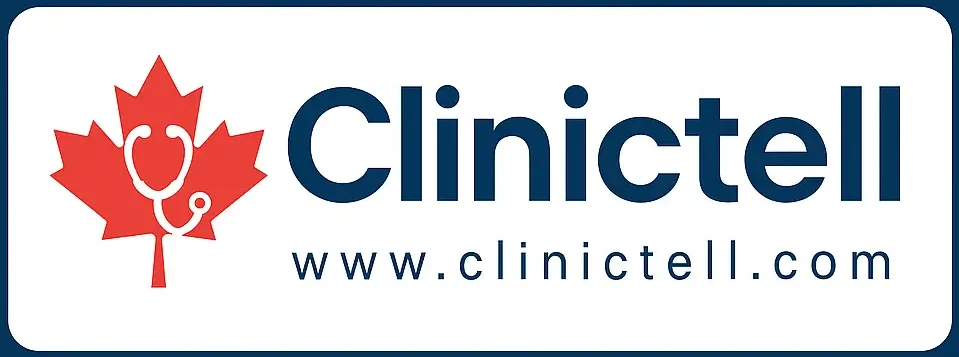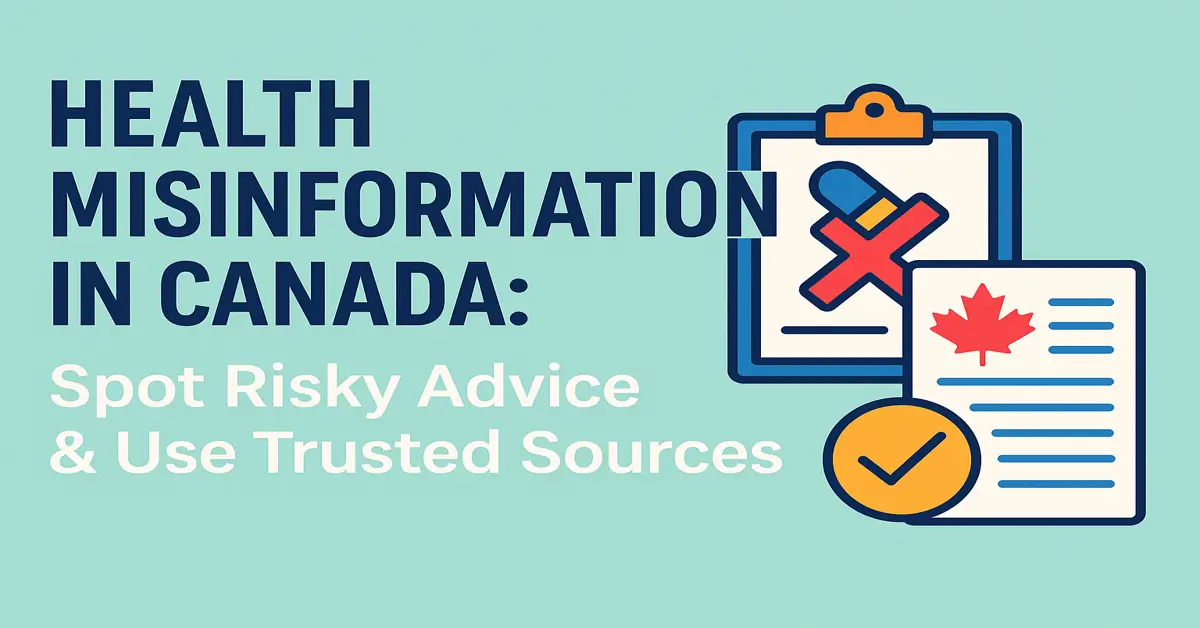Avoid dangerous health advice. This guide helps Canadians identify misinformation, use a checklist to verify claims, and turn to trusted sources like CMA, Health Canada, and ScienceUpFirst.
Introduction
In Canada, more people than ever are turning to the internet for answers about their health. A quick scroll through social media can deliver thousands of tips on everything from diet to chronic disease management. But not all advice is accurate—or safe. The Canadian Medical Association (CMA) has found that nearly half of Canadians have seen health information online that turned out to be misleading.
The risks are real. Following bad advice can delay treatment, cause physical harm, and erode trust in the health system. The good news is that with the right tools and awareness, you can learn to recognize misinformation before it spreads. This guide explains the scale of the problem in Canada, the common myths to watch for, and how to confidently separate fact from fiction.
The Scale of Health Misinformation in Canada
Health misinformation isn’t just a problem for other countries—it’s growing rapidly here at home. According to a 2025 survey by the CMA and Abacus Data, 70% of Canadians reported encountering false or misleading health information online in the past year. More concerning, over one-third admitted they had trouble deciding whether the advice was reliable.
Key Findings From the Latest Research
- 43% of Canadians said exposure to health misinformation has negatively affected their mental well-being.
- 1 in 5 people reported changing or delaying treatment because of false advice.
- Younger Canadians are particularly vulnerable since they rely heavily on platforms like TikTok and Instagram for quick health tips.
This rising tide of misinformation is amplified by the speed at which content spreads on social platforms. Algorithms prioritize viral posts—not necessarily accurate ones—meaning a dramatic headline about a “miracle cure” can travel faster than peer-reviewed evidence.
For example, during the COVID-19 pandemic, many Canadians were exposed to misleading claims about vaccines and unproven treatments. Health Canada had to issue repeated safety warnings to counter false claims circulating online. This isn’t limited to pandemics; myths about nutrition, supplements, and chronic disease management continue to spread widely.
Why Canada Is Particularly Vulnerable
Several factors make Canadians susceptible to false health claims:
- High digital adoption: More than 90% of Canadians use the internet daily, making online platforms a primary source of health advice.
- Healthcare access challenges: With long wait times for doctors and specialists, some people turn to quick online solutions instead of waiting for professional advice.
- Trust gaps: Surveys show that trust in institutions, including healthcare, has declined in recent years, opening space for alternative voices to gain traction.
This combination of digital reliance, health system strain, and lower institutional trust creates an environment where misinformation can thrive. Initiatives like Healthcare for Real are working to counteract this by helping Canadians recognize harmful advice, but the problem is far from solved.
Common Health Myths Circulating in Canada
Misinformation in Canada isn’t limited to one topic. It touches everything from vaccines to everyday lifestyle choices. While some myths are easy to spot, others sound scientific enough to confuse even educated readers.
Myths That Spread Quickly Online
- Vaccine misinformation: Claims that vaccines cause infertility or contain microchips continue to appear on social platforms, despite repeated debunking by Health Canada.
- “Miracle” supplements: Products marketed as cures for cancer, diabetes, or weight loss often circulate with bold promises but no clinical evidence.
- Diet fads: From extreme cleanses to restrictive eating patterns, many diets promoted online are not supported by credible medical organizations.
- Chronic disease myths: Misleading advice often encourages people to replace prescribed treatments with herbal remedies or unverified therapies.
These myths flourish because they offer simple solutions to complex problems. A 30-second video promising an easy cure is easier to digest than a detailed report from a medical journal.
Real-World Consequences
False health advice isn’t just harmless chatter. Surveys show that some Canadians have skipped vaccinations, delayed cancer screenings, or spent money on ineffective remedies because of social media claims. These choices can cause direct harm to individuals and increase the burden on Canada’s healthcare system.
Understanding Misinformation vs. Disinformation
Not all false information is created equal. To protect yourself, it helps to understand the difference between terms that are often used interchangeably.
| Term | What It Means | Example |
|---|---|---|
| Misinformation | False or inaccurate information shared without harmful intent | A friend shares a post about a “natural flu cure” thinking it’s helpful |
| Disinformation | False information shared deliberately to mislead | Coordinated campaigns spreading false claims about vaccines |
| Malinformation | Genuine information shared with harmful intent | Leaking private medical records to damage trust |
Canada’s Cyber Centre explains that intent is the key difference. While misinformation may spread through misunderstanding, disinformation campaigns are often organized and deliberate.
Why Intention Matters
- Misinformation can be corrected with awareness and education.
- Disinformation requires stronger measures, including content moderation, legal frameworks, and public awareness campaigns.
- Malinformation crosses into privacy and security risks, making it a threat to both individuals and institutions.
Understanding these distinctions helps Canadians judge not just what is being said, but why it is being shared.
Checklist — How to Verify Health Information
Sorting fact from fiction online can feel overwhelming, but a few simple checks go a long way. Before you act on health advice, ask yourself the following:
Step 1: Check the Source
Is the information coming from a recognized medical organization, government agency, or licensed health professional? Advice published by Health Canada or the Public Health Agency of Canada carries far more weight than a viral TikTok video.
Step 2: Look for Author Credentials
Reputable health articles name their authors and their qualifications. Be cautious if the content is anonymous or written by someone without medical training.
Step 3: Review the Date
Medical guidance evolves. Information that was accurate five years ago may no longer apply today. Always look for the most recent updates.
Step 4: Cross-Reference With Multiple Sources
If you read about a new treatment or health claim, check whether it is supported by other credible outlets, such as university research centers or peer-reviewed journals.
Step 5: Spot the Red Flags
- “Miracle cure” claims with no scientific explanation
- Content that uses emotional or fear-based language
- Advice urging you to avoid proven treatments or vaccines
- Products sold as “exclusive” or “secret” solutions
Step 6: Use Fact-Checking Tools
Initiatives like ScienceUpFirst provide Canadians with accessible, evidence-based fact checks of trending health claims. These tools are especially useful for myths that spread quickly on social media.
Trusted Canadian Health Sources You Can Rely On
Not all information online is harmful. Canada has strong institutions and initiatives dedicated to providing accurate, timely, and science-based health advice. Here are some of the most reliable:
Government Sources
- Health Canada: The central authority for public health regulations, product safety, and approved treatments.
- Public Health Agency of Canada: Offers updates on disease prevention, outbreaks, and health promotion initiatives.
Professional Organizations
- Canadian Medical Association (CMA): Provides physician-backed resources and advocacy on healthcare policy.
- Canadian Nurses Association: Shares professional insights and patient care resources.
Research & Statistics
- Statistics Canada: Publishes nationwide health surveys and data on population health trends.
- Canadian Institutes of Health Research (CIHR): Funds and promotes medical research across the country.
Independent Initiatives
- ScienceUpFirst: A coalition of scientists, health experts, and communicators working to counter health misinformation in Canada.
- Healthcare for Real (CMA project): Focuses on debunking viral myths and guiding people to trusted information.
These sources are transparent, evidence-based, and accountable, making them safe starting points for any health-related question.
Harms and Risks of Health Misinformation
Health misinformation may appear harmless at first, but its consequences reach far beyond an individual’s choices. In Canada, the effects are being felt at personal, community, and national levels.
Physical Health Risks
When Canadians act on false advice, the results can be dangerous:
- Delaying cancer screenings because of a claim that diet alone can “cure” cancer.
- Stopping prescribed medications after reading about “natural alternatives” online.
- Using unregulated supplements that may interact with existing treatments.
These actions can worsen health outcomes, increase hospital visits, and lead to preventable complications.
Mental Health Strain
Exposure to conflicting or frightening health claims also takes a toll on mental well-being. The CMA survey reported that 43% of Canadians felt health misinformation had negatively impacted their mental health. Uncertainty about what to believe fuels stress, anxiety, and decision fatigue.
Systemic and Societal Risks
Misinformation also erodes trust in health institutions. When Canadians lose confidence in physicians, public health officials, or agencies like Health Canada, they may turn to unverified voices instead. This undermines public health campaigns, slows vaccination uptake, and increases strain on an already stretched healthcare system.
It also amplifies inequality. Communities with less access to healthcare professionals or credible information are disproportionately vulnerable to false claims, deepening existing health gaps.
Conclusion
Health misinformation in Canada is more than a nuisance—it’s a growing risk to individuals and the health system as a whole. False claims can delay treatment, increase stress, and undermine trust in healthcare institutions.
The good news is that Canadians have powerful tools to fight back: checklists for spotting red flags, fact-checking resources like ScienceUpFirst, and trusted institutions such as Health Canada and the CMA. By learning how to question sources and verify information, you can make safer health decisions for yourself and your family.
If you found this guide useful, share it with friends and family. Together, Canadians can build stronger resilience against misinformation and make sure the advice we follow truly supports our health.
FAQ
What is health misinformation?
Health misinformation refers to false or inaccurate health information shared without harmful intent—people often believe they are helping by passing it along.
How can I verify health advice I find online?
Check the original source, confirm author credentials, look at publication date, cross-reference with trusted institutions (e.g. Health Canada), and use fact-checking tools like ScienceUpFirst.
Can I trust influencers with medical advice?
Only if they clearly show medical credentials, cite evidence, and direct you to reputable sources. In most cases, influencers without health training are risky to rely on.
Why does misinformation spread faster than facts?
Emotional headlines and simple promises are easier to share. Algorithms favor content that drives clicks, not what’s true. That accelerates how fast false health claims circulate.
What should I do if I’ve shared false health advice?
Correct it publicly if possible—post a follow-up linking to credible sources. Delete the original if it’s harmful. Encourage others to fact-check before sharing.


About Author
Related Posts
Antimicrobial Resistance in Canada: Trends, Risks & What You Can Do
How to Book a Doctor Appointment Online in Canada (Step-by-Step Guide)
How to Use Telehealth in Canada (2025 Guide): Costs, Coverage & Online Doctor Tips
How AI in Canadian Healthcare is Transforming Care: Benefits, Risks, and What’s Next